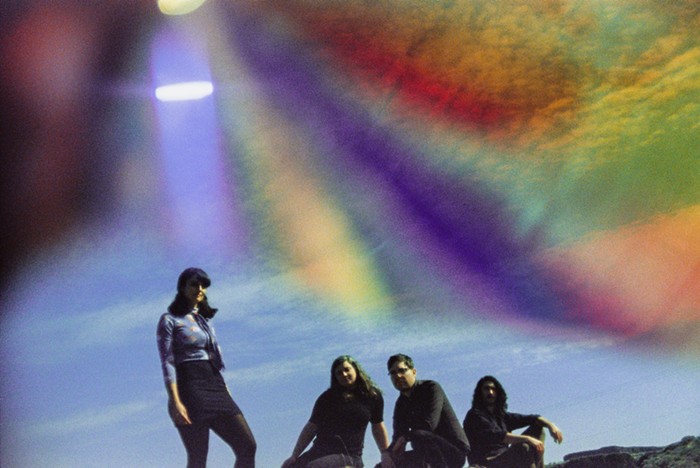After savoring Pacific Northwest Ballet's "Stravinsky 125" tribute last weekend, I became addicted to one of the finest Stravinsky recordings in years, Stravinsky in Black and White (Wergo, distributed by harmonia mundi). Subtitled "Arrangements for Piano Duet and Two Pianos by the Composer," the recording features the duo of Helena Bugallo and Amy Williams storming through The Rite of Spring, the spiky Movements (my favorite track), and other works with Stravinskyan sass.
I'm also pleased with two reissues: Tijuana Moods (RCA/Legacy) by Charles Mingus, and Robert Erickson's Orchestral, Chamber, and Vocal Music (Naxos). A rowdy jazz tone poem, Moods is a masterpiece; Mingus's bass thumps and prods beneath snaky, often burlesque themes that blend the blues and bop. This remastered disc also atones for the atrocious sound of the first CD release back in the 1990s.
In a recent conversation, Stuart Dempster reminisced about his teacher, the unjustly obscure Robert Erickson (1917–1997), who taught Pauline Oliveros and a subsequent generation of California composers in the 1960s and '70s. The Naxos disc boasts one of Erickson's masterpieces, Summer Music for violin and tape. Composed in 1974, just as electronic music effloresced with the advent of modular synths and computer-based composition, Summer Music remains sublimely simple: A violin plays mournfully alongside a field recording of a stream that ripples and drones. Erickson presciently grasped how recordings of the natural world can harbor a musical complexity that remains impossible to imitate with synthesizers and software.
Two discs culled from the British Library's legendary archive teem with superb field recordings. The first track of Sounds of the Deep, "Haddock," stutters and clicks like a vintage analog synth gone awry; the remaining recordings of leopard seals (which sound like Chewbacca from Star Wars), dolphins, and whales blur the boundary between electronic and supposedly "organic" acoustic sound. The companion disc, Sounds of the British Coastline, includes "Sea Cliffs," an early recording by one of the living legends of field recording, ex–Cabaret Voltaire keyboardist Chris Watson. British Library titles are hard to find, so unless you plan to visit London, find these discs online at www.bl.uk.
I'm also enthralled by Winter Fragments (aeon), a collection of chamber works by one of the founders of the Spectralist school, Tristan Murail. The Spectralists analyzed natural sounds such as rain and translated the data into music; resulting pieces such as Ethers and Winter Fragments shimmer like Messiaen dosed with vibrant pharmaceuticals.
And though tone poems fell out of fashion almost a century ago, composers still write them. Scelsi: The Orchestral Works 2 (mode) features the spooky Uaxuctum (pronounced "wah-shook-toom") that depicts the destruction of an ancient Mayan city. A chorus moans and cries in tandem with thundering percussion instruments while the siren-like Ondes Martenot, one of the few electronic instruments from the early 20th century (Hammond organ, theremin) still used today, soars. Coupled with the revolutionary Quattro Pezzi, whose four movements only employ a single note, Orchestral Works 2 contains some of the most forward-looking symphonic music of our time.
FRIDAY JUNE 15
AMERICAN MASTERPIECES CHORAL FESTIVAL
Seattle Pro Musica teams up with the Bellevue Chamber Chorus, Seattle Men's Chorus, and a slew of other local choral groups for this three-day festival. Through Sun June 17; see seattlepromusica.org for details. Town Hall, 1119 Eighth Ave, 781-2766, 8 pm, $30.
THE DEEP CODE
Ffej performs his album-length science-fiction song cycle, The Deep Code, which melds rock, Erik Belgum—inspired "ambient fiction," and experimental electronics along with nods to Krautrock and early Gary Numan. Syphilis Sauna, the project of HARSH honcho Patrick Urn, and Sparkle Magic open. Rendezvous, 2320 Second Ave, 441-5823, 10 pm, $5.
SATURDAY JUNE 16
SEATTLE REPERTORY JAZZ ORCHESTRA
A great pop singer, an unforgettable soloist, and an eagle-eyed bandleader, trumpeter Louis "Pops" Armstrong was, in Duke Ellington's words, "the epitome of jazz." The SRJO honors Armstrong by mustering five fine trumpeters—Jon Pugh, Tatum Greenblatt, Vern Sielert, Jay Thomas, and Thomas Marriott—as well as vocalist Bernie Jacobs, to swing (and sing) the tunes "Pops" made famous. Buddy Catlett, Armstrong's bassist in the 1960s, joins the fun. Also Sun June 17 at the Kirkland Performance Center at 3 pm. Recital Hall at Benaroya, 200 University St, 523-6159, 7:30 pm, $16—$34.
DAVID PAUL MESLER
I regret that most living classical composers have ceded songwriting to their pop-music confreres, who generally stick with tried-and-true verse-chorus-verse structures. Set to poems by Whitman, Dickinson, Langston Hughes, Raymond Carver, and other American poets, Mesler's songs—sung here by mezzo-soprano Barbara Hume—blend the best of both genres. Mesler couples the deft word-setting heard in the 20th century's best art-song composers (Poulenc, Rorem) with an immediacy born of pop and Broadway. Soundbridge Space at Benaroya, 200 University St, 336-6600, 8 pm, $10/$15.


















